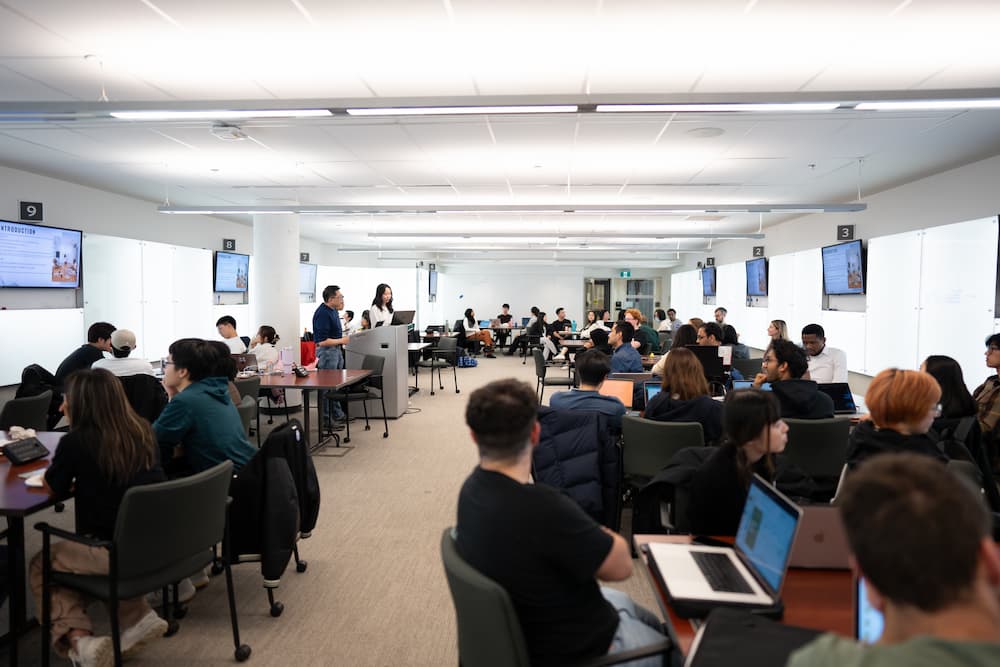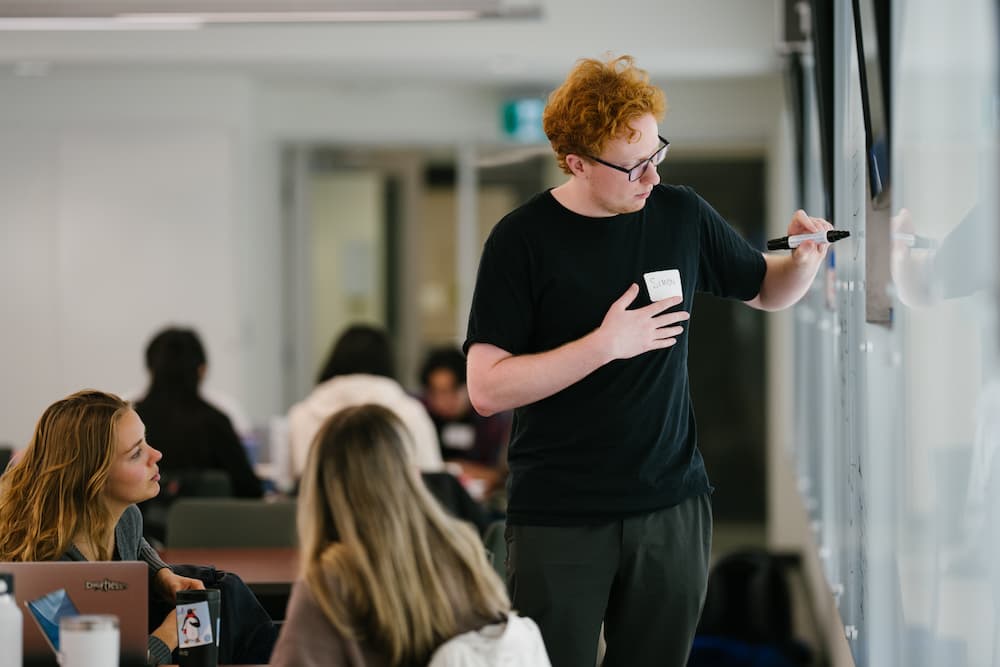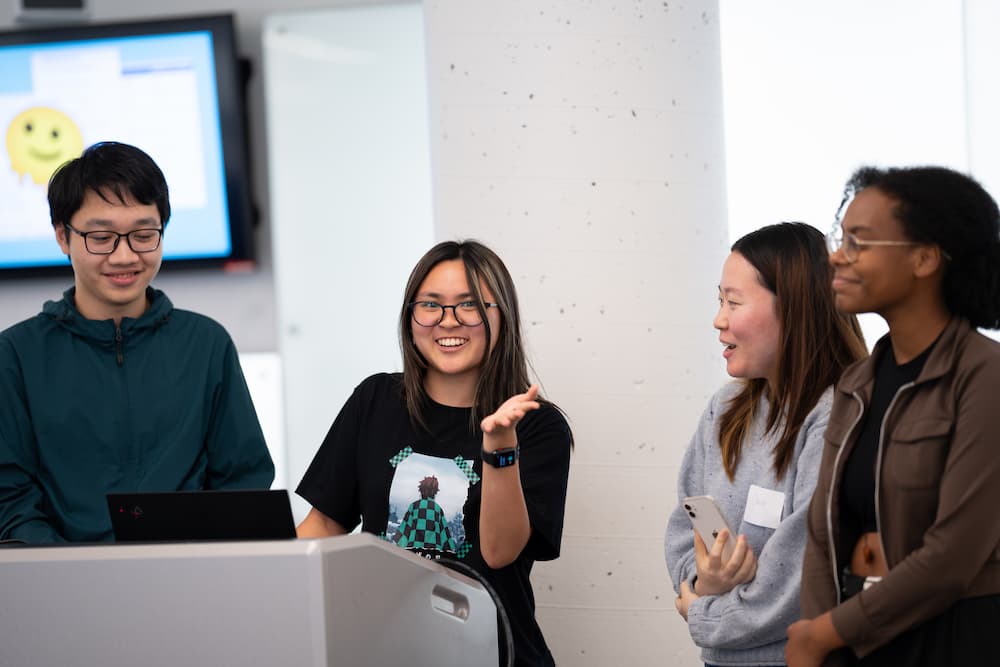The UBC Learning Analytics Hackathon is an annual event that brings together students, researchers and instructors to create, design, and explore data-driven solutions for enhancing teaching and learning at UBC. This year, the 9th edition of the Hackathon took place on November 4, 2023, with 100 UBC students from various disciplines and backgrounds participating in this all-day event.
Imagine you had data that represented all of your student activity in a Canvas course – what would you build?!
The goal of the UBC Learning Analytics Hackathon was for students to find creative ways to use Canvas, UBC’s learning management system, and its data to improve the teaching and learning experience. With participants ranging from the Faculty of Science, Arts, and Sauder School of Business, this year’s organizers couldn’t wait to have them start working on this year’s challenge.

“This year, we wanted to make the event more personal for participants by giving them the opportunity to use and experiment with their own Canvas data,” explains Alison Myers, programmer analyst at the CTLT and one of this year’s organizers. “That way, they get to see what data is gathered based on their activity in the learning management system.”
Canvas provides a rich source of data on student activities, interactions and outcomes, which can be used to gain insight into learning processes and behaviours, identify patterns and trends, and develop tools and dashboards to support students and instructors. These tools, combined with the power of Learning Analytics, can help predict student success, identify areas of improvement in a course structure, track student progress, and much more.
In addition to their own data, participants could also choose to work with a large and granular dataset from real-life UBC Canvas student data, with anonymized and obfuscated information to ensure privacy, or combine both. The dataset included data on a wide variety of areas, such as user-generated content (exercises, group discussions), navigation events (which items are viewed by students, in which order), and other granular data.
Working with this data is also a foundational experience for students interested in a career in Learning Analytics, since the work required on this data to be useful – gathering, cleaning and analysis – is what professionals do every day.
Building tools to enhance the teaching and learning experience
After the introduction to the challenge and the dataset by the organizers from the UBC Learning Analytics Team, LAVA, Open UBC, members of the Faculties of Arts and Science, and the CTLT, participants then formed teams and brainstormed ideas for their projects.
Throughout the day, they worked on their projects with the help of mentors from the organizing team. As groups they explored the datasets, identified areas where they could improve the teaching and learning experience, and prepared a pitch to present a prototype of their project by the end of the day.

The main objective of this year’s Hackathon was to give participants the opportunity to interact with their own data, so they could build tools that would enhance their own learning experience using Canvas. With this unique experience and ideas for improvements, participants were able to prototype tools that mattered to them, such as how to find the right course, overcome procrastination and identify factors that affect student performance.
Another aspect that gathered interest among participants is the instructor’s view of Canvas. Thanks to Learning Analytics tools, participants can design projects to help instructors identify previously unknown insights about their course structure, student participation, to name a few, through interactive dashboards and tools that can benefit their teaching and, ultimately, their students’ learning.
Regardless of their topic of interest, this year’s participants had the additional opportunity to use Generative AI tools in their project. From a planning and analysis assistant to compile Canvas data, to a central role as an instructor/student companion or even an AI-powered academic advisor, the versatility of these tools was on full display.
“This was the first Learning Analytics Hackathon where I noticed participants were making use of GenAI tools to help analyze and build their projects,” explains Justin Lee, programmer analyst at the CTLT and one of the organizers. “I was impressed by the way GenAI was incorporated into some projects to drive genuinely useful functionality, like a chatbot integrated with Canvas that could answer questions like: “When is my next exam?”
“We neither forbade nor encouraged the use of GenAI tools in projects,” Alison continues. “We really wanted to leave the door open so participants could have the freedom to experiment with any tool they chose and see what they could come up with.”
Finding new ways to optimize teaching and learning
At the end of the day, each team presented their projects to a panel of judges who evaluated them based on their impact on teaching and learning, technical excellence and wildest idea. Participants also voted to elect the project that resonated with them the most.

For the project most grounded to teaching and learning, the panel recognized a tool built to help instructors visualize how their course is accessed by their students on Canvas, so they can identify potential gaps in knowledge, whether the content of the course is laid out intuitively for students, and optimize their Canvas course structure accordingly, all through analyzing students’ behaviours on the Canvas course.
For technical excellence, the organizers were impressed by a ChatGPT companion implemented into Canvas. Built directly in the system, the companion could combine participants and anonymous data to help students summarize information specific to a course, identify what to study next, as well as when to best engage with a course discussion for better impact.
Among the many wild ideas developed by students, the jury chose the creation of a working group and study partner based on Canvas engagement metrics, such as the amount of time spent on a specific page, to recommend other students to study with, based on similar behaviours and viewing frequencies.
“Every year I am impressed with the creativity of the proposals, and how much students are able to do with so little time,” Alison explains. “This year, I was particularly impressed with the student presentations – nearly all of them were creative, polished, and the students did a fantastic job not only coming up with very cool ideas, but presenting them particularly well.”
The Hackathon was a valuable experience for both participants and organizers, as well as a fun and collaborative event that helps highlight the expertise of the UBC teaching and learning community.
The Learning Analytics Hackathon took place on November 4, 2023 in the Sauder Learning Labs, a space designed to facilitate teams in using critical thinking and analytical decision making to solve real-world problems. The event was hosted by the UBC Learning Analytics project, LAVA (Learning Analytics, Visual Analytics), with staff volunteers from the members of the Faculties of Arts and Science, and the Centre for Teaching, Learning and Technology.

